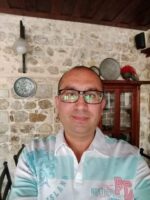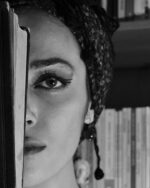Translated from the Turkish by Selin Lara Lotus
I draw the streets that remain in the memories of a distant past, the roofs, and windows of the houses. I close my eyes, passing through a door to ancient times; to experience a journey within me, to places where I can look for my losses. In the old bazaars, white beards, rosaries, old coughs, coffee, tobacco, and dust smells…
I am moving slowly through the streets of a distant past world. Birds sound from a great plane tree behind a mosque. Hundreds of birds, bird nests, storks, herons, and sparrows. Like the birds in the picture. Their voices are from ancient times.
I walk through one of the narrow streets of the city in a thin morning mist, moist earth, and the smell of mold. Downstairs, windows of old houses along the sidewalk. In pots behind iron bars, the seedy foliage of plants that have not seen a day is a nuisance inside. In a few of them, distorted flowers are smeared with dust and discarded.
The sound of Zeki Müren comes from an open window. The sound of a song that calls to memories of ancient times. Down the sidewalk, a room. On the floor are a carpet, a console, and a sofa. An old woman sits in the corner of the window. Fatma Grandma. Again, sitting motionless thirty years ago. It will sit without expecting anything from the future, in a time without tomorrow, without asking any questions, without thinking. Alone in a basement room given to him, o seems to be frozen in the eye sockets with o‘s dried eyes.
Fatma Grandma looks ahead again. With its stance in old times. The voice of Zeki Müren goes on and on, continuing in the time of thirty years ago. As everything gets older, as it becomes more alienated, the Fatma Grandma is out of those voices. O‘s eyes look at the darkness, without seeing anything.
Stone walls on all sides, stone houses in the stone-paved streets. It’s like walking through the narrow streets of a medieval city. There are whispers somewhere. Very close to me, as soon as I can be heard, conversations walking with me. No one appears around. I recall a conversation from time immemorial.
As I wandered, I suddenly found myself in the streets of my childhood. Behind a wall come the sounds of children. A schoolyard. The voices of my elementary school friends are like a distant echo. Our old cat! It was lost a long time ago. We were sad that she was no longer visible. My mother said that she was a cat of the breed.
An old-time bazaar. Old acquaintances sitting in shops, like the people in the photos. None of them look back, none of them speak. A few seniors are in front of the coffee. They are so distracted and silent in their own world. In the opposite plane tree, the branches are swaying, with a hum similar to the sound of a cascade. And these are the birds of ancient times. Who knows.
The city of my childhood is now a memory city far away, far behind. Şevket Efendi died many years ago. But now, again with his cane, I see him climbing the neighborhood slope. Mr. Abbas, Mr. İhsan, who was sitting in front of the café, they also died. They listen to the hum of the branches of the sycamore while waiting for the rosaries in their hands and the prayer time. Their eyelashes are dusty, and they look at their predecessors without blinking at all.
I could almost hear my mother’s voice. From far away, it seems like o is calling out to me with my name. The voices of the people in the pictures are not heard. The birds in the sycamore are also already dead. Those dead birds are the ones that fly above my head now. The old people in front of the bazaars, in front of the shops, are the shadows of those who have already disappeared. A clock steals past tenses inside me; the old times whose shadows came out to me from far away.
I paused; I was looking at roads that were divided in various directions, where they were going. I suddenly saw my mother! I froze in deep excitement where I was. O was approaching me from the left side, a little below. When o saw me, o was not at all surprised as if it were a normal encounter. O‘s eyelashes and eyebrows are dusty. Steps as they come from far away; tired, heavy, reluctant. O looks at her without blinking. O‘s face is pale, weak, and dry.
I had never seen my mother so weak. It was the sky covered with the cloudy, heavy clouds of the day o left us, again the sky above us. Everything was in a purplish light; The surroundings were half as bright as the northern night. It’s our first encounter after a long separation. After so many times of longing. I sensed a state of strangeness that made me hesitate and that I found strange.
We are on a deserted street. Stone walls on both sides are dilapidated houses. Everything was weird. With an aggravated old air, the basement smells similar to dust and mold smell coming from the doors. The silence of living the old times in all the houses. The curtainless, dark windows have never been opened for many years. There are no children, no women in sight. A door opened and closed, but I couldn’t see anyone.
Like me, my mother may have found this environment strange. O was not yet accustomed to these quiet streets, to the houses with stone pots in front of them, with flowers made of stone. My mother wasn’t talking. O was looking at the road that stretched beyond under the sycamores. For o, it was a symbol of separation and eternity, the path I came from. O‘s gaze had changed a lot. There was a difference in o‘s stance as if he had seen very distant places that were forbidden to us and learned things that should be kept secret. It was as if o was living in another time, far away from me.
I was surprised by the meeting. Attached to o with all my being, I didn’t know what to do with the sadness of seeing o fall for granted. To tell o that she was not alone, that I was with o, I entered o‘s arm with the desire to strengthen o. O’s introverted state, and sad silence, made me sad.
There was a stagnation on o‘s face that had been cut off from his surroundings, that had suffered a lot of loneliness, that had lost his power alone. I thought about how I could help o. There was nothing I could do.
“Mom, I want to leave you some money.”
“Here, you don’t need money.”
O speaks in a deep, whispered, far-fetched voice.
“I’ll give you half of my money, Mom. Not much, but…”
It doesn’t. The rest home was in a place like a dormitory for the elderly. It was a cold-faced, depressing city. O‘s neighbors were all strangers. Nothing was in o‘s heart.
A little further on, a cloud of yellowish dust lifted by the wind was moving away from the top of the houses. We walk. The side streets are deserted. Above the walls are stunted fig trees, the leaves of which are dusted. The doors of all houses are closed. Spider webs in their small, dark windows.
The owners left and left, all at once. An old man walks by with a cane in his hand. His eyebrows and eyelashes are covered in dust. He turned the corner and disappeared. These foreign streets are growing more and more uneasy which makes me shudder. A cold wind blows in the trees.
Our old days were far away, hopeless losses. O didn’t want to talk about what was left behind. It was obvious that o missed our home very much. But our house was sold. O didn’t know that. My brother sold it because he would no longer live in that house. O‘s world in the past, his relatives, everything, was inaccessible.
There was the sadness of being away from the places my mother loved in o‘s stillness. Those who were left behind along the roads of no return were the ones they missed. O missed our days together. There was no going back in time. O did not ask any of his relatives or friends. They had all become people of another world.
Birds that I had not seen before began to pass over us. It was weird, everything was something that separated me from my mother. There was something between us that prevented us from getting closer to each other.
It was my mother’s face and gaze that were now a thing of the past. It was far away even when I was with o. I was silent with the sadness and despair of my childhood years.
A fluttering curtain that flutters through a window that remains open inside me, blowing out in the breeze, into the void of a cloudy day. In front of the door of our house, a child sitting on a stone was crying. That kid was me.
“I have to go,” my mother said. “Our time is up.” Always the same whisper on your lips.
Someone else was passing by us. I recognized him. My mother was his neighbor in the room where o was staying when o was in the hospital. That hospital corridor again… The nurse who came and went with hectic steps. In a room, a bed in front of the window. Lysol odors in the air. The muffled hum of distant corridors, rooms. Vague echoes from the depths…
“I’m leaving,” my mother said. O stared into my eyes still, looking far away.
The fog began to intensify again. I froze as my mother walked away. O was walking with the others. O‘s steps were not like o‘s old steps. As I was about to approach the corner, o turned o‘s face towards me, looking one last time in the mist. It was like o was looking through a photo. O‘s posture was as distant as in the yellowed old-time photograph, sad. First I lost o‘s eyes, o‘s face, then o‘s shadow on the way away.
Our old days were far away, hopeless losses. O didn’t want to talk about what was left behind. It was obvious that o missed our home very much. But our house was sold. O didn’t know that. My brother sold it because he would no longer live in that house. O‘s world in the past, o‘s relatives, everything, was inaccessible.
Note: In Turkish, the ‘o’ pronoun is roughly equivalent to the ‘that’ pronoun in English. ‘O’ is a neutral pronoun. The author consciously retains the ‘o’ pronoun to represent the mother/female characters. For the possessive version of the pronoun, ‘o’ with an apostrophe followed by an ‘s’ has been used for the convenience of the readers.
Read twenty micro poems and two other poems, self-translated from the Greek by Katerina Agyioti, and published in The Antonym:
Follow The Antonym’s Facebook page and Instagram account for more content and exciting updates.



























0 Comments